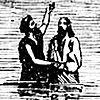- Baptists in the history of separation of church and state
-
Part of a series on Baptists  BackgroundPriesthood of all believers
BackgroundPriesthood of all believers
Individual soul liberty
Separation ofSola scriptura
church and state
Congregationalism
Ordinances · Offices
ConfessionsKey figuresJohn Smyth
Thomas Helwys
Roger Williams
John Bunyan
Shubal Stearns
Andrew Fuller
Charles Spurgeon
D. N. Jackson
William Bullein Johnson Baptist portal
Baptist portalSeparation of church and state is one of the primary theological distinctions of the Baptist tradition.
Contents
History
Originally, Baptists supported separation of church and state in England and America.[1][2] Some important Baptist figures in the struggle were John Smyth, Thomas Helwys, Edward Wightman, Leonard Busher, Roger Williams (who was a Baptist for a short period but became a "Seeker"), John Clarke, Isaac Backus, and John Leland.
English Baptists
In 1612 John Smyth wrote, "the magistrate is not by virtue of his office to meddle with religion, or matters of conscience". That same year, Thomas Helwys wrote that the King of England could "command what of man he will, and we are to obey it," but, concerning the church — "with this Kingdom, our lord the King hath nothing to do." In 1614, Leonard Busher wrote what is believed to be the earliest Baptist treatise dealing exclusively with the subject of religious liberty.[3]
American Baptists
The Danbury Baptist Association of Danbury, Connecticut sent a letter, dated October 7, 1801, to the newly elected President Thomas Jefferson, expressing concern over the lack in their state constitution of explicit protection of religious liberty, and against a government establishment of religion.
In their letter to the President, the Danbury Baptists affirmed that "Our Sentiments are uniformly on the side of Religious Liberty — That Religion is at all times and places a matter between God and individuals — That no man ought to suffer in name, person, or effects on account of his religious Opinions — That the legitimate Power of civil government extends no further than to punish the man who works ill to his neighbor..."[4]
As a religious minority in Connecticut, the Danbury Baptists were concerned that a religious majority might "reproach their chief Magistrate... because he will not, dare not assume the prerogatives of Jehovah and make Laws to govern the Kingdom of Christ," thus establishing a state religion at the cost of the liberties of religious minorities.
Wall of separation
Thomas Jefferson's response, dated January 1, 1802, concurs with the Danbury Baptists' views on religious liberty, and the accompanying separation of civil government from concerns of religious doctrine and practice. Jefferson writes: "...I contemplate with sovereign reverence that act of the whole American people which declared that their legislature should 'make no law respecting an establishment of religion, or prohibiting the free exercise thereof,' thus building a wall of separation between Church & State."[5] This doctrine, known as the "wall of separation" or "strict separationism," would later become highly influential in 20th century Supreme Court understandings of the relationship between church and state. As a result, the relevance of this letter is a subject of heated debate, with scholars such as Robert Boston emphasizing its importance, and others such as Mark David Hall arguing that the letter was a historical outlier.[6][7]
Contemporary American Baptist views
In the U.S. today, a significant group of Baptists, as well as some other Protestants, believe the United States was formed as a Christian nation by the Founding Fathers.[8] They assert that the term "separation of church and state" in no way limits religion in the state, but merely refers to the state's responsibility to refrain from exerting authority over ecclesial bodies.
However, many Baptists in the United States still believe in the wall of separation and support maintaining it. For example, fifteen Baptist organizations, representing collectively over 10 million Baptists in America, collaborate with one another to protect religious liberty and the separation of church and state through their funding of the Baptist Joint Committee for Religious Liberty.[9] Freedom of conscience is a historic Baptist distinctive, and many Baptists continue to believe the best course for obtaining and securing freedom of conscience is through the separation of church and state.[2][10]
See also
References
- ^ Baptist Historian Dr. Alan Lefever, lecture at Truett Seminary
- ^ a b "Baptist Heritage". Baptist Joint Committee for Religious Liberty. 2010. http://www.bjconline.org/index.php?option=com_content&task=view&id=33&Itemid=55. Retrieved 16 August 2010.
- ^ Busher, Leonard (1614). Religious Peace: or, a Plea for Liberty of Conscience.
- ^ Danbury Baptist Association, Letter to Thomas Jefferson, 1801
- ^ Jefferson's Letter to the Danbury Baptists (June 1998) - Library of Congress Information Bulletin
- ^ Boston, Robert. Why The Religious Right is Wrong About Separation of Church & State. Prometheus, Buffalo, New York, 1993, p. 221.
- ^ Hall, Mark David. “Jeffersonian Walls and Madisonian Lines: The Supreme Court’s Use of History in Religion Clause Cases". Oregon Law Review. 2006
- ^ Cox, Daniel and Jones, Robert P. Religion and the Tea Party in the 2010 Election: An Analysis of the Third Biennial American Values Survey. 2010. Retrieved 22 October 2010.
- ^ "Our Mission". Baptist Joint Committee for Religious Liberty. 2010. http://www.bjconline.org/index.php?option=com_content&task=view&id=77&Itemid=136. Retrieved 16 August 2010.
- ^ Deweese, Charles W. (2001). "Doing Freedom Baptist Style: Freedom of Conscience". Baptist History and Heritage Society. http://www.baptisthistory.org/pamphlets/freedom.htm. Retrieved 16 August 2010.
Categories:- Baptist
- Separation of church and state
- Secularism in the United States
Wikimedia Foundation. 2010.
